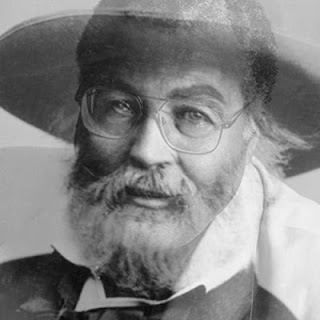I Hear America Singing
I hear America singing, the varied carols I hear,
Those of mechanics, each one singing his as it should be blithe
and strong,
The carpenter singing his as he measures his plank or beam,
The mason singing his as he makes ready for work, or leaves off
work,
The boatman singing what belongs to him in his boat, the deck-
hand singing on the steamboat deck,
The shoemaker singing as he sits on his bench, the hatter singing
as he stands,
The woodcutter's song, the ploughboy's on his way in the morn-
ing, or at noon intermission or at sundown,
The delicious singing of the mother, or of the young wife at work,
or of the girl sewing or washing,
Each singing what belongs to him or her and to none else,
The day what belongs to the day—at night the party of young
fellows, robust, friendly,
Singing with open mouths their strong melodious songs.
by Walt Whitman
Courtesy Poem of the Week
I
hear America singing, the varied carols I hear,
Those of mechanics, each one singing his as it should be blithe and
strong,
The carpenter singing his as he measures his plank or beam,
The mason singing his as he makes ready for work, or leaves off work,
The boatman singing what belongs to him in his boat, the deckhand
singing on the steamboat deck,
The shoemaker singing as he sits on his bench, the hatter singing as he
stands,
The wood-cutter's song, the ploughboy's on his way in the morning, or
at noon intermission or at sundown,
The delicious singing of the mother, or of the young wife at work, or of
the girl sewing or washing,
Each singing what belongs to him or her and to none else,
The day what belongs to the day—at night the party of young fellows,
robust, friendly,
Singing with open mouths their strong melodious songs. - See more at:
http://www.poets.org/viewmedia.php/prmMID/15752#sthash.NaiToFfb.dpuf
I
hear America singing, the varied carols I hear,
Those of mechanics, each one singing his as it should be blithe and
strong,
The carpenter singing his as he measures his plank or beam,
The mason singing his as he makes ready for work, or leaves off work,
The boatman singing what belongs to him in his boat, the deckhand
singing on the steamboat deck,
The shoemaker singing as he sits on his bench, the hatter singing as he
stands,
The wood-cutter's song, the ploughboy's on his way in the morning, or
at noon intermission or at sundown,
The delicious singing of the mother, or of the young wife at work, or of
the girl sewing or washing,
Each singing what belongs to him or her and to none else,
The day what belongs to the day—at night the party of young fellows,
robust, friendly,
Singing with open mouths their strong melodious songs. - See more at:
http://www.poets.org/viewmedia.php/prmMID/15752#sthash.NaiToFfb.dpuf





